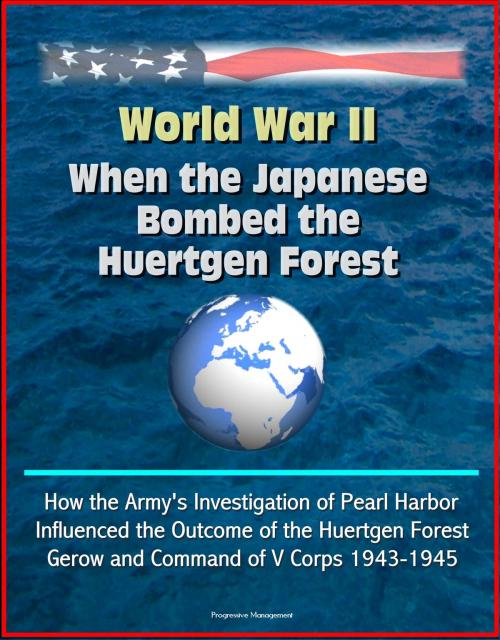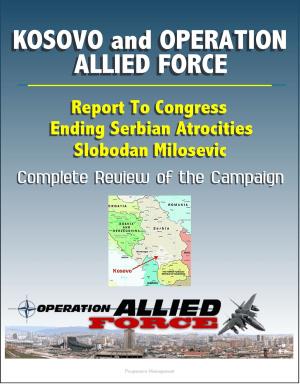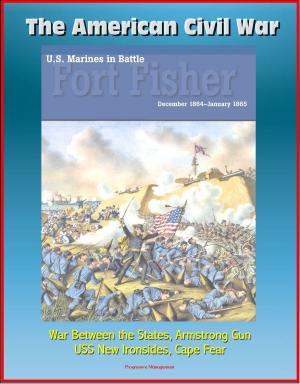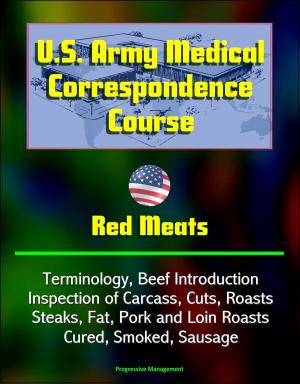World War II: When the Japanese Bombed the Huertgen Forest: How the Army's Investigation of Pearl Harbor Influenced the Outcome of the Huertgen Forest, Gerow and Command of V Corps 1943-1945
Nonfiction, History, Military, United States, World War II| Author: | Progressive Management | ISBN: | 9781311735867 |
| Publisher: | Progressive Management | Publication: | February 15, 2016 |
| Imprint: | Smashwords Edition | Language: | English |
| Author: | Progressive Management |
| ISBN: | 9781311735867 |
| Publisher: | Progressive Management |
| Publication: | February 15, 2016 |
| Imprint: | Smashwords Edition |
| Language: | English |
Professionally converted for accurate flowing-text e-book format reproduction, this paper examines the effect of the Pearl Harbor investigation of the V Corps commander, Major General Leonard T. Gerow, on the German battles in World War II.
In September of 1944, Major General Leonard T. Gerow, the V Corps commander was relieved of command in combat to return to the United States and testify before the Army's Investigation Board on Pearl Harbor. The board eventually found General Gerow partially responsible for the American defeat at Pearl Harbor. After testifying before the board General Gerow returned to Europe where he resumed command of V Corps.
The timing of the board, the nature of its findings and its effect on him disrupted his confidence and capability to command. In the month he was absent from the front his corps as well as the overall Allied situation had changed. The Allied armies were logistically culminated; short of trained combat personnel and facing determined German resistance. The findings of the board also stung him personally and affected his relationship with superior officers. His embarrassment coupled with mute resentment towards the investigations findings would prove disastrous in the coming month.
Less than three weeks after his return from testifying, V Corps initiated a series of attacks to secure the Ruhr River dams in western Germany. These dams were crucial to subsequent allied advances into northern Germany. These attacks were launched into a heavily wooded area known as the Huertgen Forest. The attempt to seize this area was met with fierce German resistance and heavy U.S. casualties. His tactical effort during this offensive was his poorest performance of the war. He was uncharacteristically remote from his subordinates, micromanaging, and physically absent from the battlefield. Prior to the Huertgen his was one of the most successful corps commanders in the U.S. Army in Europe. His corps landed on D-Day at Omaha Beach, fought through the hedgerows of Normandy, liberated Paris and was one of the first units to enter into Germany. The battle for the Huertgen was a dark blemish on an otherwise distinguished career.
The timing of the Pearl Harbor Investigation and his terrible performance in the Huertgen was not a coincidence. His unsatisfactory accomplishment during the Huertgen was related to the investigation. Less than a month after his failed attack, the Germans launched their final counter-offensive of the war. The Ardennes Offensive was his moment of redemption. Gerow was one of the first leaders to recognize the nature of the Nazi attack. During the battle he was energetic, resourceful and very effective in blunting the German assaults. He was present on the battlefield when needed, he was quick and adamant about requesting support and he made rapid and inventive decisions that greatly contributed to the corps success and the ultimate Allied victory.
Professionally converted for accurate flowing-text e-book format reproduction, this paper examines the effect of the Pearl Harbor investigation of the V Corps commander, Major General Leonard T. Gerow, on the German battles in World War II.
In September of 1944, Major General Leonard T. Gerow, the V Corps commander was relieved of command in combat to return to the United States and testify before the Army's Investigation Board on Pearl Harbor. The board eventually found General Gerow partially responsible for the American defeat at Pearl Harbor. After testifying before the board General Gerow returned to Europe where he resumed command of V Corps.
The timing of the board, the nature of its findings and its effect on him disrupted his confidence and capability to command. In the month he was absent from the front his corps as well as the overall Allied situation had changed. The Allied armies were logistically culminated; short of trained combat personnel and facing determined German resistance. The findings of the board also stung him personally and affected his relationship with superior officers. His embarrassment coupled with mute resentment towards the investigations findings would prove disastrous in the coming month.
Less than three weeks after his return from testifying, V Corps initiated a series of attacks to secure the Ruhr River dams in western Germany. These dams were crucial to subsequent allied advances into northern Germany. These attacks were launched into a heavily wooded area known as the Huertgen Forest. The attempt to seize this area was met with fierce German resistance and heavy U.S. casualties. His tactical effort during this offensive was his poorest performance of the war. He was uncharacteristically remote from his subordinates, micromanaging, and physically absent from the battlefield. Prior to the Huertgen his was one of the most successful corps commanders in the U.S. Army in Europe. His corps landed on D-Day at Omaha Beach, fought through the hedgerows of Normandy, liberated Paris and was one of the first units to enter into Germany. The battle for the Huertgen was a dark blemish on an otherwise distinguished career.
The timing of the Pearl Harbor Investigation and his terrible performance in the Huertgen was not a coincidence. His unsatisfactory accomplishment during the Huertgen was related to the investigation. Less than a month after his failed attack, the Germans launched their final counter-offensive of the war. The Ardennes Offensive was his moment of redemption. Gerow was one of the first leaders to recognize the nature of the Nazi attack. During the battle he was energetic, resourceful and very effective in blunting the German assaults. He was present on the battlefield when needed, he was quick and adamant about requesting support and he made rapid and inventive decisions that greatly contributed to the corps success and the ultimate Allied victory.















